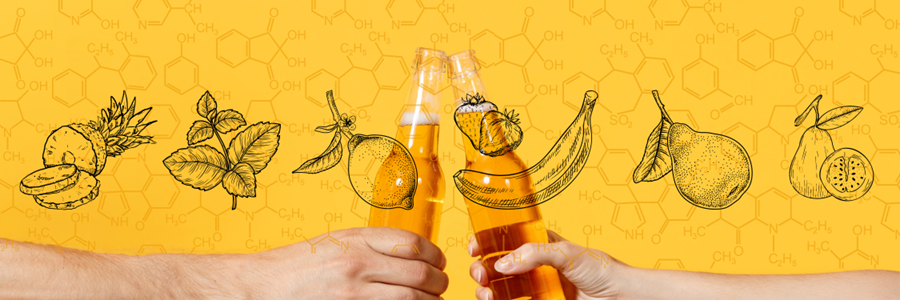
Ever since the term synthetic biology (synbio) – the genetic engineering of microorganisms to produce novel ingredients – entered our everyday lexicon, synbio developers have been searching for ways to disassociate the process from its genetic modification heritage. One of the most-often-used descriptions to make the synbio process and its novel products more normalized, acceptable, and consumer-friendly has been, “It’s just like brewing beer!” Well, we’ve now come full circle, with developers genetically engineering yeast in order to produce… wait for it… synbio beer!
In general, four primary ingredients are used to brew beer: yeast, malt, hops, and water. Different types of yeast yield different types of beer. Saccharomyces cerevisiae (ale yeast) is a top-fermenting yeast and works best at warm temperatures. Saccharomyces pastorianus (lager yeast) is a bottom-fermenting yeast and works best at cool temperatures.
Other types of yeast, including Brettanomyces, Lactobacillus, and Pediococcus, which are sometimes referred to as wild yeast, can also be used to achieve specific flavor profiles. Beer also gets flavor compounds from hops, which add a range of subtle aromatics as well as a slight bitterness, which has led “hoppy” beers to become more popular in recent years. But beer is a complex, nuanced product, and much of that nuance is provided by numerous aromatic compounds such as terpenes, esters, and phenols.
The developers of genetically engineered brewing yeasts have multiple objectives, including creating novel flavor profiles (both forward and nuanced), imparting traditional flavors to enable a cost savings through the elimination of an ingredient (such as hops), or eliminating compounds that dominate and mask other more subtle flavors (such as diacetyl, which imparts a buttery flavor).
Although hard numbers are difficult to ascertain, it appears that these genetically modified yeasts are becoming more popular in the craft, or artisanal brewing sector. Below is a sampling of genetically engineered yeast developers and the brewers that have embraced these biotechnology-derived yeasts to make synbio beer.
Berkeley Yeast (formerly Berkeley Brewing Science)
Berkeley Yeast (Berkeley) was founded in 2017 by a group of Ph.D.s from U.C. Berkeley who were experimenting with using CRISPR to genetically engineer brewing yeast. An early goal was to create the flavor profiles imparted by hops without the use of hops. To achieve this, the developers added DNA not from hops but rather from mint and basil to their yeast. However, Berkeley soon received some push back, especially from hops growers.
The company now uses genetic engineering to develop new yeast strains that offer a range of attributes for both brewers and winemakers – some that are even engineered to enhance the flavors of natural hops. Other yeast strains have been developed to impart flavors of pineapple (Sunburst), guava and passionfruit (Tropics), or citrus (Superbloom). Berkeley also engineers yeast to produce lactic acid and ethanol in order to create sour beers (Galactic), as well as diacetyl-free (DF) strains, and works closely with brewers to create customized yeasts.
Oregon State University
In 2022, it was announced that researchers at Oregon State University collaborated with developers at Berkeley Yeast to genetically engineer yeast to express an enzyme that augments tropical fruit flavors in their synbio beer, including guava, passionfruit, mango, and pineapple. According to a bioengineer from Berkeley Yeast who was involved in the project, the genetically modified yeast strains developed as part of the research are now being used by more than 100 breweries in the U.S.
Omega Yeast Labs
Founded in 2013, Omega Yeast Labs (Omega) uses CRISPR to create genetically engineered yeast for both professional and home brewers. Omega has created fruit-forward yeasts, such as Bananza (flavor of ripe bananas) and Sundew (flavors of strawberry, passion fruit, pear, and stone fruit). In both cases, these flavors stand out not because of what was added to the DNA of the yeast but rather what was eliminated, specifically phenols that previously dominated the flavor profiles.
The company has also developed a series of thiolized yeasts, such as Cosmic Punch Ale, Star Party Ale, Lunar Crush Lager, and Helio Gazer Ale. Thiols are organic compounds present in hops that impart aromas of black current, citrus, or tropical fruit.
In June of this year, Omega launched a series of diacetyl knock out (DKO) engineered yeast strains. The following month, the company announced that it had identified the gene in yeast that makes beer hazy, which it has named HZY1. This discovery will allow the company to further customize yeast strains.
Breweries
An increasing number of breweries are embracing genetically engineered yeasts to create novel craft beers. Noble Rey Brewing, Perennial Artisan Ales, Devil and the Deep Brewery, and Broad Ripple Brew Pub all have testimonials on the Omega Yeast website. Other breweries that are embracing genetically engineered yeasts and the beers made from these yeasts include:
- Drake’s Brewing Co. – Weird Science, This Beer Creates Opportunity, and Steroid Era (no longer available)
- Fieldwork Brewing – Loser's Club Vol. VII14
- Temescal Brewing – Secret Solutions Double IPA
- Lagunitas – Marial Martian Express
- Watts Brewing Company – Bee Gee IPA
- Single Speed Brewing Co. – Arctic Fox
- Bissell Brothers/Sapwood Cellars collaboration – Book Learning Double IPA
- Cellarmaker Brewing – Most in-house beers
The Non-GMO Project’s Standard defines all crops and products developed using biotechnology, including new gene-editing techniques, as GMOs. We share this information to further one of the Project’s primary goals of creating greater transparency in the supply chain, ensuring you have the information you need to make the best choices for you, your brand, and your family.
Please note that the information herein is for general informational purposes only and is based on the linked sources above.
The Non-GMO Project is a 510c3 nonprofit dedicated to protecting and promoting non-GMO alternatives. New GMO Alerts is supported by funding from readers like you. Donate today
